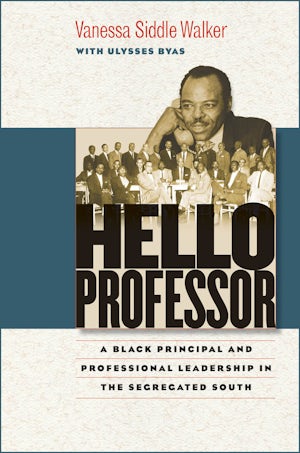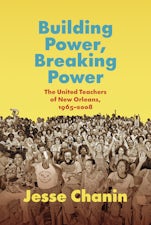Hello Professor
A Black Principal and Professional Leadership in the Segregated South
By Vanessa Siddle Walker
with Ulysses Byas
312 pp., 6.125 x 9.25, 14 illus., 1 map, notes, bibl., index
-
Paperback ISBN: 978-1-4696-1384-0
Published: January 2015 -
E-book EPUB ISBN: 978-0-8078-8875-9
Published: August 2009 -
E-book PDF ISBN: 979-8-8908-8375-9
Published: August 2009
Buy this Book
- Paperback $45.00
- E-Book $29.99
For Professors:
Free E-Exam Copies
Walker explains that principals participated in local, regional, and national associations, comprising a black educational network through which power structures were formed and ideas were spread to schools across the South. The professor enabled local school empowerment and applied the collective wisdom of the network to pursue common school projects such as pressuring school superintendents for funding, structuring professional development for teachers, and generating local action that was informed by research in academic practice. The professor was uniquely positioned to learn about and deploy resources made available through these networks. Walker's record of the transfer of ideology from black organizations into a local setting illuminates the remembered activities of black schools throughout the South and recalls for a new generation the role of the professor in uplifting black communities.
About the Author
Vanessa Siddle Walker is professor in the Division of Educational Studies at Emory University and author of Their Highest Potential: An African American School Community in the Segregated South.
For more information about Vanessa Siddle Walker, visit
the
Author
Page.
Reviews
"Contributes to the field of the history of education by offering a personal portrait of a black school administrator during the Jim Crow era. . . . Historians of education have tended to focus on black leaders in higher education, and Walker's book not only widens the lens but also reveals the complexity of the position."--Jayne Beilke (Dept. of Educational Studies, Ball State University Teachers College), H-Education Reviews
"A powerful book."--Ethnic and Racial Studies
“Walker’s examination of Byas’s life successfully rescues from obscurity the stories of similar educators and reestablishes the rightful place of the black professor in the history of black education.” --The Journal of Southern History
"Hello Professor empirically expands our understanding of the formal and informal ways in which the professional identities of black principals in the segregated South were cultivated, nurtured, protected, and affirmed. Walker and Byas's work illuminates a principal leadership model that is invisible in educational administration scholarship, yet visible in the lived experiences of many."--Melanie Carter, Howard University
"Finally, here is an accounting that gives voice and status to black principals and organizations of the pre-integrated era. Although set in the segregated South, Professor Byas's story transcends time and locality, offering a comprehensive approach to leadership that is fitting armor to attack today's educational woes."--Linda J. Guidry, senior director, The College Board
"Hello Professor moves far beyond the study of schools and principals to provide an excellent historical biography of a principal who navigates professional and community organizations to better address the needs of the black community. A very moving story."--Derrick Alridge, University of Georgia




